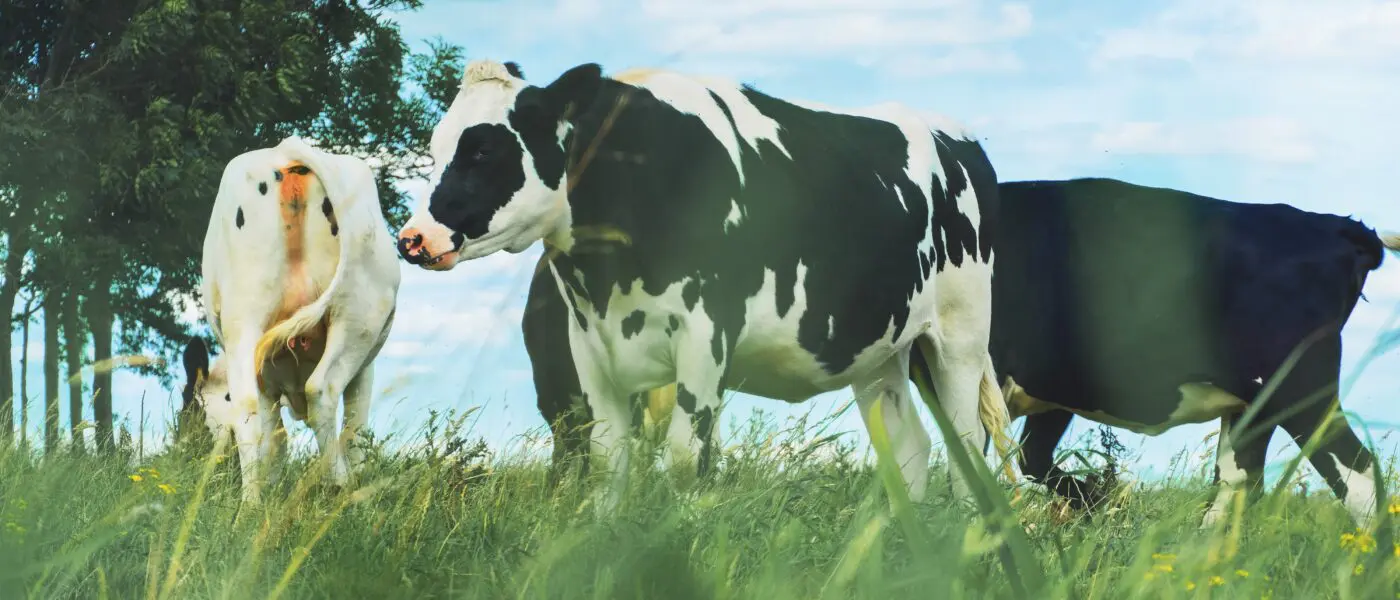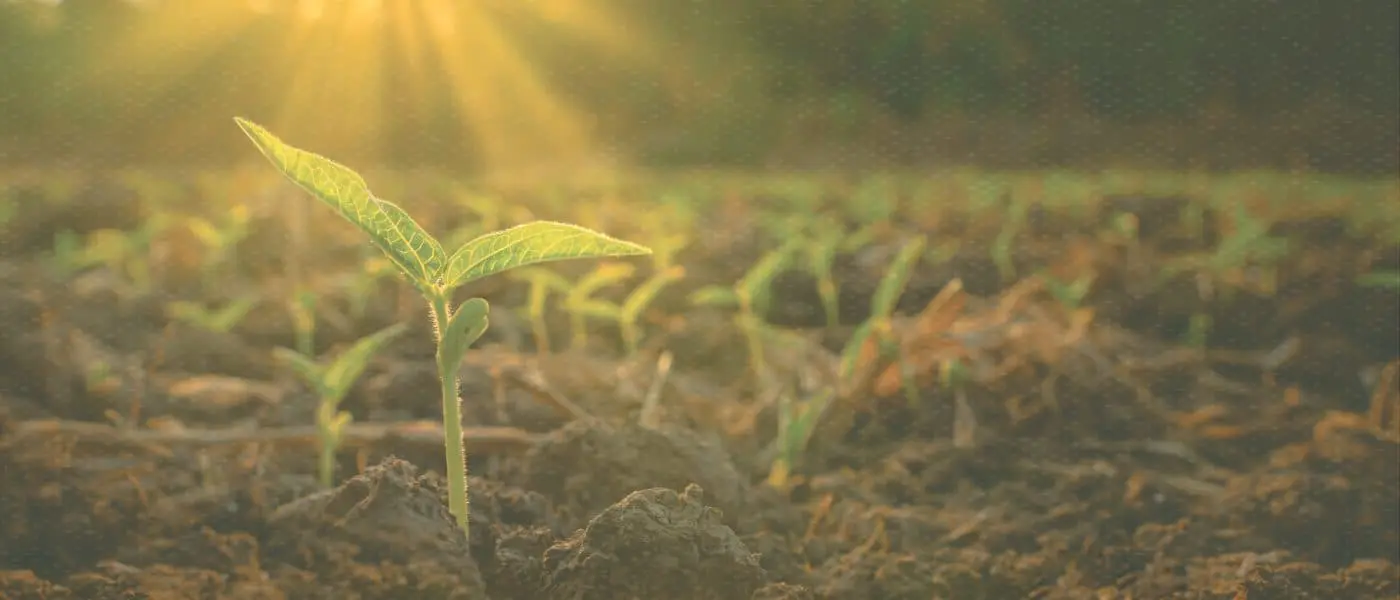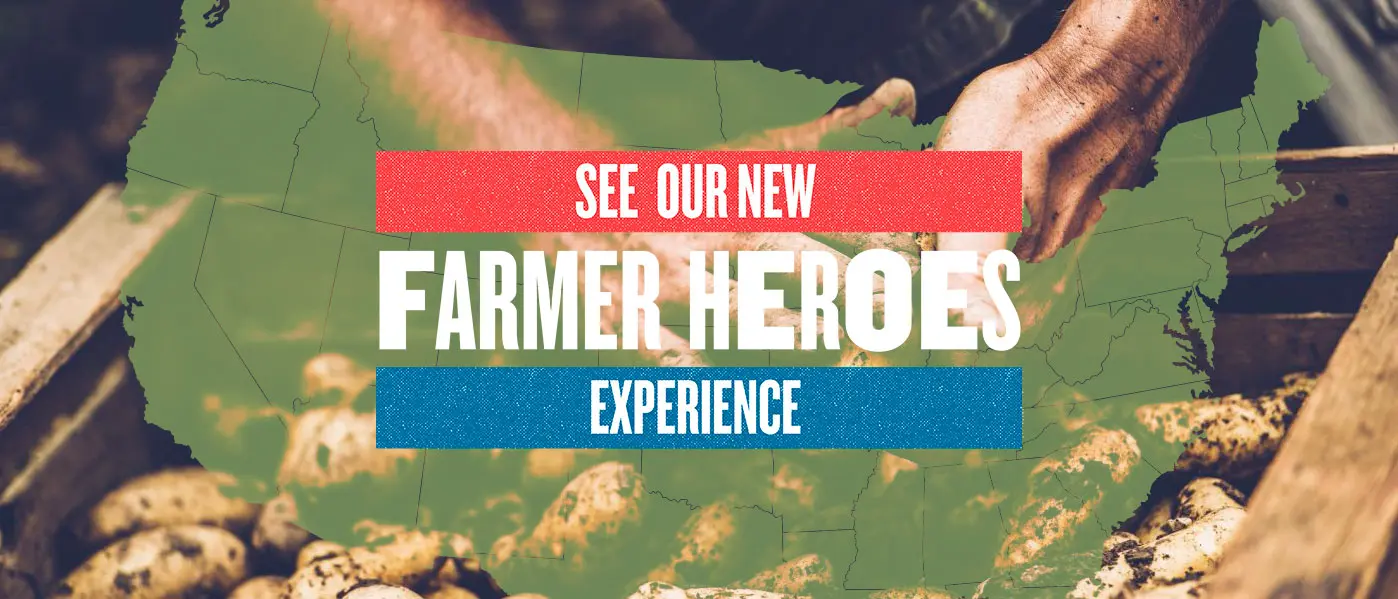Dairy farms are up against some big hurdles right now, from climate change to alternative milks. They’ve always suffered ups and downs in the markets that have impacted the ability of small and medium sized dairies to survive. Because of this, decades ago the concept of check-off programs was developed to help promote commodity farm products like milk. The check-off is a mandatory fee that many U.S. farmers, ranchers and producers pay every time they sell any of these 22 commodities, including beef, pork, milk, corn and soybeans.
These fees fund research and promote the product or a commodity as a whole, without mentioning specific brands. The idea is that producers benefit from the research, product development, consumer education and promotional activities. But the program has come under fire recently, and dairy provides a good example of why. Millions of dollars paid by struggling farmers have funded marketing sponsorships with major league sports teams, corporations and celebrities. It’s difficult to trace those dollars back to a thriving local farmer. That’s where Granite State Dairy Promotion is different.
We recently sat down with Amy Hall, Director of Granite State Dairy Promotion, a small and local check-off program dedicated to New Hampshire dairy farmers. Below is a lightly-edited transcript from that conversation where you can learn all about Amy’s program and the innovative ways in which she’s marketing New Hampshire milk to consumers.
Cristina: We’re curious about how check-off programs work and how they’re funded. Could you tell us a little bit about them?
Amy Hall: Sure. In 1983, The Dairy and Tobacco Adjustment Act was implemented. This provided a marketing avenue for dairy as a commodity. Dairy producers were on their farms and – no pun intended – they were very siloed. They weren’t a Coca-Cola; they weren’t a national brand that had their own marketing agency. So, very simply, that’s why the check-off program began. It exists to help farmers market their dairy commodities. To increase the sale and use of their products.
Dairy producers are paid for every 100 pounds of milk they produce. And 15 cents of what they’re paid goes to the check-off program. 5 cents is mandatory to the national program, and that other 10 cents goes to either a local or regional marketing program.
Here in New Hampshire there are a few options: You have Granite State Dairy Promotion – a stand alone program – and New England Dairy and Food Council, a regional program. Here in New Hampshire, we give our dairy producers a choice: They can send their dimes all to the New England Dairy and Food Council or they can send it all to us, or a third option is to do an even split (5 cents to New England 5 cents to us). We feel giving farmers free choice is very important and unique.
Jessica: How much revenue does that actually provide for your program?
Amy Hall: Not a lot here in New Hampshire as we continue to hemorrhage farms. We don’t have nearly the amount of money regional programs receive. They have millions to work with. Our budget is about $175,000 a year and we do the best we can with what we have.
Jessica: You’ve mentioned that your organization is different from other check-off programs. Can you tell us more about that?
Amy Hall: Yes. We do things a lot differently here at Granite State Dairy Promotion. A majority of other check-off organizations are on the same train, promoting the same message, the same programs, and while there’s nothing wrong with their message, we are just so unique. I don’t want to sand down edges until we are no longer edgy. Someone has to stand out and be distinct; and that’s us.
“My goal is to help the local farmers who work so darn hard every single day. There’s no reason to buy California milk when local [New Hampshire] farmers in your community produce a great product.”
Cristina: Can you tell us a little bit about what you do that helps promote local dairy?
Amy Hall: One of the things that’s extremely important and valuable to me are my farmers and their livelihoods; keeping them thriving. For me, it’s not about going out and buying just any dairy product as a commodity off the shelf and calling it a day. I represent New Hampshire farms, their products, and their voice. We don’t represent other states outside of that.
One of our newest campaigns to bolster New Hampshire dairy is called, “Check Your Jugs.” You see, every milk jug comes labeled with a two-digit state code followed by a two or three-digit plant code. Those codes are usually found near the expiration date, but could also be located on the label. A 33 state code indicates that milk was bottled and processed in New Hampshire.
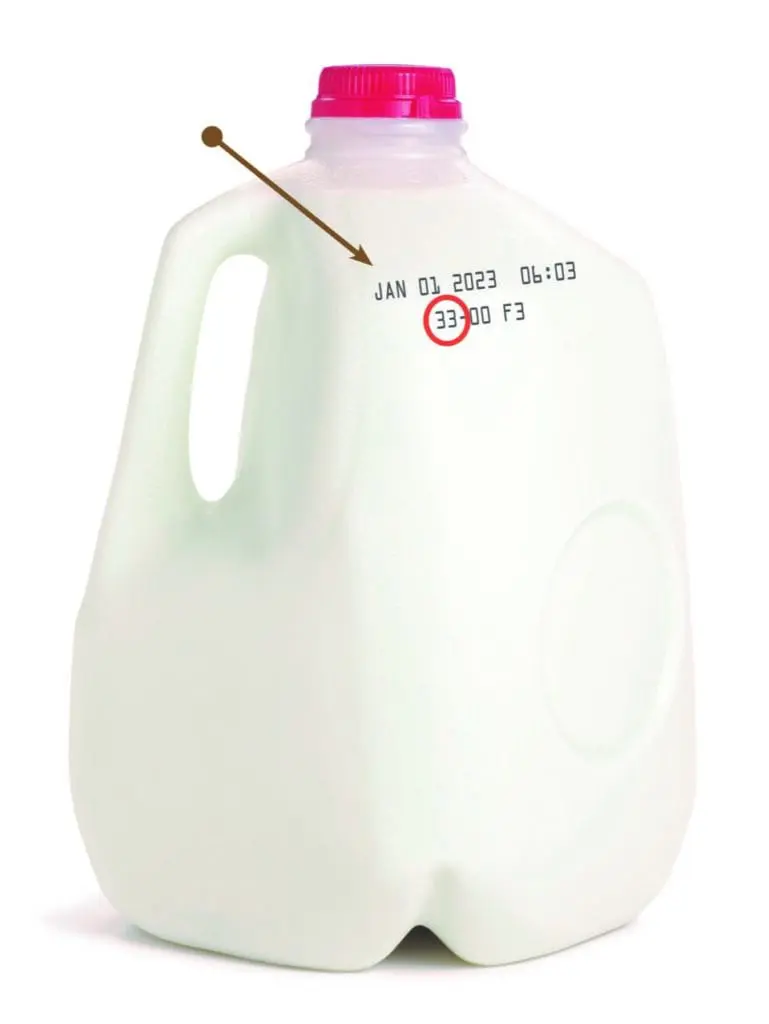
Two-digit dairy code for NH
Right now, the more farms we lose, the more product we’re having to import. We even have some California milk in New Hampshire, and to me that’s just unacceptable. There’s no reason for it. Our farms and farmers are ready and able to produce the milk needed. So the message is simple: Check your jugs and make sure you’re buying New Hampshire milk, or at the very least, a product from a New England dairy farm.
I know that’s what consumers want. We conducted a survey with the University of New Hampshire, and 83% of people said they want to buy local milk and local products. They just never knew to look for the two-digit code on their milk jugs before our campaign started.
There were no other check-off programs heavily promoting that local code; some weren’t promoting it at all. Not until Granite State Dairy Promotion started an entire campaign surrounding it. There has been some replication, which is exciting to see. My goal is to help the local farmers who work so darn hard every single day. There’s no reason to buy California milk when local farmers in your community produce a great product.
Jessica: How many dairy farmers are there in New Hampshire right now?
Amy Hall: 92 in total as of today. That number changes monthly or yearly, though it never goes up. The average herd size in New Hampshire is only 130 cows, so they’re all very, very small. To put this into perspective, in 1970 there were well over 800 family dairy farms in New Hampshire.
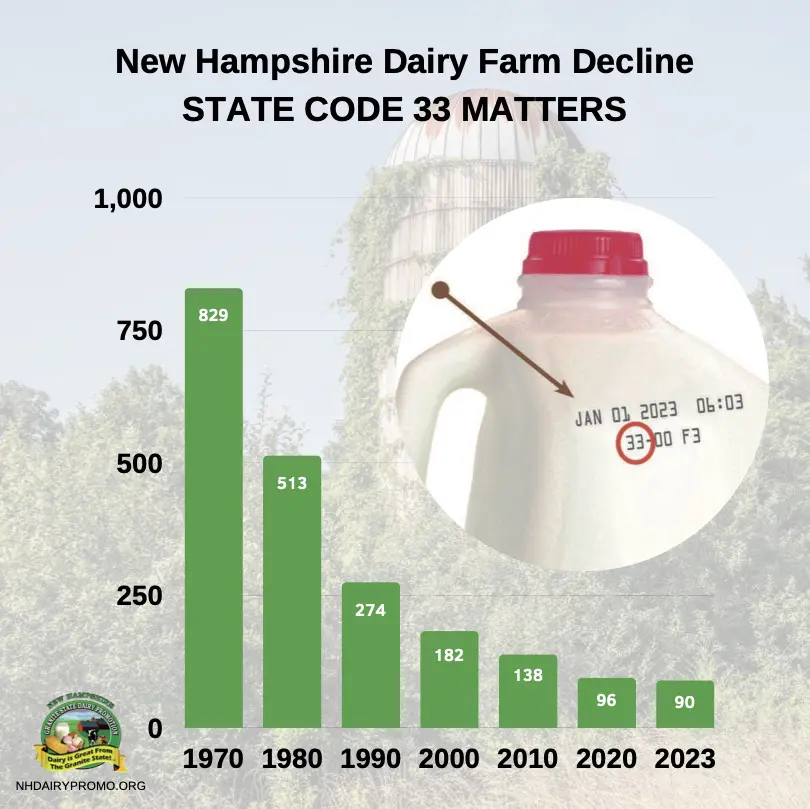
Jessica: Wow. What’s causing that sharp decline? Are there particular challenges that dairy farmers face in New Hampshire?
Amy Hall: They are small family farms, so their ability to compete in a very large market from outside of New England is insurmountable. Dairy farmers across the country have no say in what they’re paid. So their milk revenue varies from month to month. Just imagine not being able to accurately predict your paycheck.
Milk is a commodity. So price is based on consumption and how much of that product we have in the market. And you can’t turn off a cow the same way you can turn off a water faucet. When the market is flooded, the price paid to farmers drops significantly. The global economy is also in play, because we’re dealing with imports and exports too. And on top of that, dairy farmers are having to compete with alternative beverages like oat milk and almond milk. We’re seeing the consumption and sales of those alternatives increase and that’s a big concern.
It’s not just New Hampshire farms, but we feel it a little bit more because our farms aren’t large enough to sustain such drastic blows.
Another reason we’re losing farms is that I see very few kids who grow up on a dairy farm who want to take on the daily challenges of dairy farming. They’ve watched their parents struggle, and signing up for the same, isn’t very appealing. That’s not to say this is every child of a dairy farmer, I know of several who have stayed on the farm, but a majority do not.
Cristina: From your perspective, how are dairy farmers in your region experiencing climate change?
Amy Hall: I can tell you that in 2016 we had a severe and massive drought here in New England, and we saw a lot of farms go out of business as a result. Dairy farming is dependent on the crops grown to feed cows. If there is no water, food for cows is hard to come by. We see year after year that drought tends to become more and more prevalent. It also tends to be a little bit longer lasting than it would have been in the 1980s or the 1990s. In 2020, just as dairy farmers were facing Covid and their markets were shutting down overnight, they were experiencing a mild drought on top of it all.
Jessica: So how does Granite State Dairy Promotion help alleviate some of these climate and pricing challenges?
Amy Hall: We’ve found that what consumers value most is local farms and local products, and up until now, it has not been easy nor tangible for them to identify local milk. The Check Your Jugs campaign has been a sigh of relief for consumers, now they know what to look for. If I can increase the sale of local Dairy, that will directly benefit my local farms here in New Hampshire.
Jessica: What’s bringing you hope? What are you most proud of about the work that you’re doing?
Amy Hall: I’m most proud of my dairy farmers. They’re so resilient. They’re so strong and they face insurmountable challenges every day with a lot of adversity, yet they wake up every single day, and they keep going. And I know they’re in the barns at 4 am. And I do my best to be behind my desk at 5 am. If they’re working, I want to be. I’m extremely proud of them, and even if they couldn’t hold on, even if they were one of those farms who had to close their barn doors, I am no less proud of them for their perseverance and the amount of dedication they had for feeding their community. To say it’s an honor and a privilege working for them would be an understatement.
I’m also really proud of how distinctive Granite State Dairy Promotion is in the world of check-off programs. We believe that our dairy producers should not only have a choice of where their money goes, but that they need to have a voice. That when they show up to a board meeting, sitting at my table, that every single one of their voices matter. I have just under 100 bosses. That’s the way I see it, and every single one of them is valuable. Their input is valuable, and their voice is valuable. I’m extremely fortunate that they embrace the uniqueness of Granite State Dairy Promotion. They understand how important it is to be different from all the other programs out there; they support me and my often-crazy ideas every step of the way.
Jessica: How can our readers learn more about Granite State Dairy Promotion?
Amy Hall: They can follow us on social media, Facebook and Instagram, where we tend to be most active. I do my best to make sure that our content is relevant and current, and something that will be of value to consumers.
Cristina: Is there anything else that you want us to know?
Amy Hall: We are just so stand alone. We’re not an ordinary check-off program. We do function as one by the rule of law and we follow the rules and guidance of the USDA. Outside of that we’re independent, and quite frankly, we do what we want to do, and we don’t hop on the same wagon that everybody else is on. Our programs work and make a significant impact. The Check Your Jugs campaign was talk of the town, nationally.
We may be small, but we’re certainly mighty. We rattle cages, not intentionally, but that alone means we must be doing something right. It’s tremendously beneficial, not only to New Hampshire, but to the industry in general, to have an outlier willing to step outside of the status quo. We certainly do that, and this is only the beginning.
Cristina: Well, your farmers clearly believe in you because you’re able to do great work for them.
Jessica: Agreed! Thank you very much for speaking with us!
Not in New Hampshire? Click here to learn your state milk code
Visit Granite State Dairy Promotion's website Learn more about the how the check-off program doesn’t always support farmers the way that Granite State Dairy Promotion does.